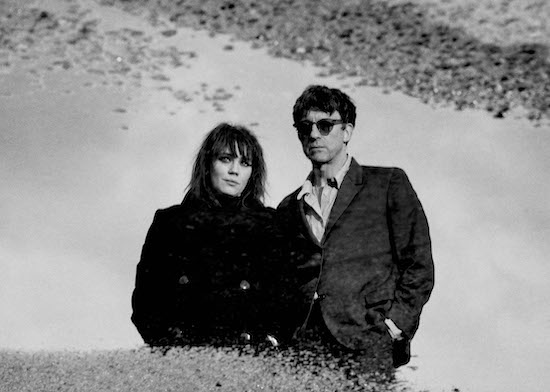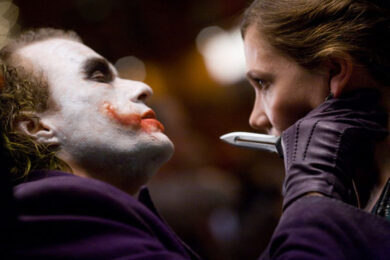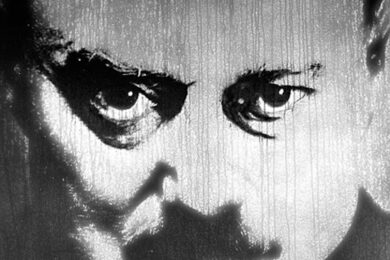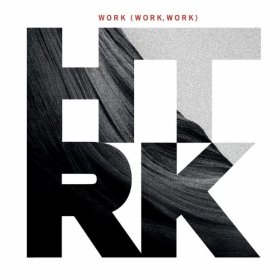The Waeve by Steve Gullick
Music writers. Who needs ’em? We recently had the opportunity to get both members of The Waeve together. We left Rose Elinor Dougall and Graham Coxon to have a conversation about their individual and joint practice, without any interference from us.
Dougall was a member of high concept "indie pop girl group" the Pipettes during the noughts, and has since enjoyed a solo career that has seen her release three critically praised albums and work with Mark Ronson, Baxter Dury and Wayne McGregor.
Coxon is, of course, known worldwide as the guitarist in Blur, but he also has a solo career in which he has chalked up nine albums so far. Last year, his autobiography Verse, Chorus, Monster! was published by Faber and Faber.
The Waeve represent a triangulation of interests, a convergence of post punk, psych folk and classic British pop. They met backstage at a London venue in 2020 and a collaboration was born, with the pair recording at Coxon’s home studio in London.
Earlier this month, they released a self-titled debut album on Transgressive, on which the pair play nearly all of the instruments between them (drums were added by producer James Ford of Simian Mobile Disco) including Coxon on saxophone and a medieval lute called a cittern, with Dougall letting loose on an ARP2000 modular synth as well as piano.
Graham Coxon Interviews Rose Elinor Dougall
Who was the first singer you heard that affected you?
Rose Elinor Dougall: I’m sure there were others before this, but I do have a clear memory of sitting in the front room and choosing to put Debut by Björk in the CD player. I must have been about seven years old. I remember being so struck by the strange, untethered freedom of her voice, how she used it in so many different ways even within one song. It was such a world away from the voices I would hear on Top Of The Pops or in the charts, and maybe that opened my ears up to a whole different universe of what singing could be.
What was your first singing performance?
RED: Apparently I sang the entirety of ‘The Nearness Of You’ when I was about three during lunch in a Hampstead restaurant in front of my grandparents. It was an unsolicited performance, the sort that became not out of character. My dad used to sing me to sleep with songs like that so I must have learnt the words from him. One of the first performances I really remember was when I was 14 and I used to take music lessons. The tutor would put his students into little bands for yearly concerts, and I think I sang Stealers Wheel’s ‘Stuck In The Middle With You’ and ‘Hanging On The Telephone’ by Blondie amongst others. I remember feeling so surprisingly at ease singing in front of all these people, even though I was horribly awkward and self-conscious in day-to-day life. I’m still surprised by myself in that way even now!
Were you in any way nervous when you joined The Pipettes, or the music business in general?
RED: I never thought I was joining ‘the music business’ when I joined The Pipettes, I was just excited about being asked to play with this older group of people I admired and getting to hang out in Mockingbird Studio in Brighton; it felt like a life I’d always wanted was starting to begin. There were lots of bands around at that studio at the time who were doing it for real (Sea Power, Electrelane, Electric Soft Parade, Eighties Matchbox B-Line Disaster among others) and it was so exciting to be in the orbit of that world. This was during the last few years of the old paradigm of the music industry, so it felt like everything was still possible. If only I’d known, ha!
When you left The Pipettes, what did you think the future held for you?
RED: Well, this was at the start of 2008 so, again, it still felt like it was viable to pursue some semblance of a career in music. I really had no idea, but I knew that I needed to try and discover who I was as a songwriter outside of the tight confines of The Pipettes. There was so much more I wanted to learn about making music; I’d felt frustrated and trapped in that space by the end. I wanted to try and reconcile my music with my own identity, or at least try to. It turns out that’s a hard old business, I wonder if I will ever not be Rose from The Pipettes! All that feels like something to do with a completely different person now.
How do you generally go about writing a song?
RED: It’s changed over the years. I used to be far more focused on writing coherently structured chord progressions – verse, middle eight, chorus, blah blah blah – which were always on piano; or I would need to come up with lyrical ideas first. Perhaps as I’ve become a bit more fluent with music software I’m now free to start from different places, like with a rhythm or a repetitive bass line. I’m more interested in seeing how far I can push smaller ideas, to get more out of less, letting the music breathe more. [Working] with you felt more fluid and freer, we could just bat ideas back and forth. There was the ability to make music spontaneously and fast, not over think or get too insular and tight. That’s the best fun.
Is recognition important for you?
RED: I don’t know. I’ve had such a strange relationship with all that, I think most creative people do. I’ve made a lot of music over the last 12 years, but I’ve had to do it all on my own without much support from the industry. Luckily, I think I’ve just about managed to retain a sense of humour about it all!? Also, I think a healthy bit of bitterness is no bad thing! It can sometimes feel like you’re pouring all this energy into a black hole, and I’ve found it hard to initiate the courage to start again at times, but I’ve been fuelled by the recognition and belief from other musicians, like you! I think feeling supported and having a small community of musicians you respect around you is the most tangible thing, that’s enough recognition in my book.
What was East London like creatively back in the 2000s and 2010s?
RED: I moved to east London in 2008, so in some ways it was already starting to die. I had a sense that I’d maybe arrived a tiny bit too late to the party, but there were still interesting things happening in Shoreditch for example. My main sense of it all was through the filter of the various bars and pubs I drank in and worked in, but you could feel through those places that there was still a sense of place and community. It all still felt up for grabs when I arrived, and maybe I’m not tuned into what’s happening in the same way anymore, but I really don’t feel like there is the same sense of possibility in London now, especially not in east London.
What struggles as a woman have you come up against during your solo career?
RED: I think I have been relatively lucky in some ways as I have had a predominantly positive experience, knowing so many brilliant, respectful, and sensitive musicians who have supported my work through the years. I would like to say that it’s got easier as I’ve got older, but even only recently I was jokingly and dismissively referred to as ‘hormonal’ when I made a point effusively to a major label A&R man. (I was six months pregnant, which somehow makes it even worse.) It’s these kinds of micro aggressions that women have had to put up with forever. One of the main problems is that there are simply still too many of the same kind of bloke running the show. I’ve spent uncomfortable hours in studios with men wanting to write my lyrics for me, or telling me how to sing, all the standard stuff. And there have been times – with the benefit of experience – I now realise were far from appropriate. This stuff just simply was not discussed when I started out, and it is so brilliant to see that young women are wiser and stronger than ever. But the whole music world is far from where it needs to evolve to. I’m interested to see what I will come up against now that I am a mother, those environments certainly are not set up to support women in that way, but I am determined to find a way. It’s my job, and just like any other woman, and I have every right to pursue it.
What ambitions did you have back in your late teens and how do they relate to those you have now?
RED: I wanted to make records, write songs and play shows. I always wanted to be part of that world, I always wanted music to be my central reason for being. Now that I’m in my mid 30s I’ve had to find other ways to survive over the years, and it’s been hard to keep working but I’ve managed to make three solo albums, I’ve worked with so many brilliant people, and now am about to release this record which is probably my proudest achievement. It’s the music I always dreamt of making, so I think my teenage self would be pretty pleased.
Over the years, what singer has been the one you listen to time and time again and still get affected in the same way?
RED: It’s a predictable answer probably, and of course there are loads of others, but Joni Mitchell still accesses something deep in me. Her voice, melodies, lyrics and playing still feel like the most incisive, most free, most poetic, most intelligent and most human to me. It sums up everything I look for in music. It’s just the real deal.
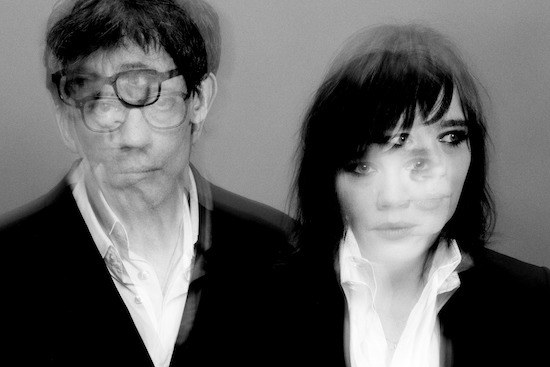
The Waeve by Steve Gullick
Rose Elinor Dougall Interviews Graham Coxon
Describe your first memory of experiencing music emotionally.
Graham Coxon: My first memories of reacting to music, emotional or not, were on a space hopper in the early 70s. Maybe I was around four. ‘Ballroom Blitz’ by The Sweet and ‘Revolution’ by The Beatles were what got me going. I remember playing around with the balance on my dad’s stereo to try and isolate the vocals on Rubber Soul, so I could hear the words or the drums and turn them up! I can remember being soothed by ‘If You Leave Me Now’ by Chicago, and not really knowing why it was so soothing or knowing even why I might have needed soothing. But life is an assault, no matter what age you are, and connecting with music and the emotion behind music and lyrics builds empathy and connects you with basic but huge and important emotions. It can be like a vibe that soaks up melancholy or the sheer noisy joy of ‘Anyway Anyhow Anywhere’ by The Who.
What qualities or energy do you look for when you’re writing music that reconnects you to that feeling? What are you searching for when making music?
GC: I like the music I make to take unexpected turns, so there’s always something there that may have come from my subconscious or maybe occurred by accident, so I feel that I lost control of the process, leading to something happening devoid of my own will. It feels like a sort of authentic channeling of creativity when that happens. Words are always the most difficult aspect. I don’t like cliché in lyrics (or general speech really) so I will always try to express myself in what I think is a direct but fresh, poetic way. The TV is so full of cliché and tired buzzwords that it feels as if the world is getting dumber and more devoid of individuality, which is depressing in the extreme.
No one plays guitar like you. When did you first realise you were becoming fluent in your playing and that you were developing your own musical language to communicate with?
GC: I don’t think guitarists ever really know. They are always in the process of developing their “touch”, their “feel”. Something happened in the 90s when my focus turned to a more “action” style of playing. I think it might have been something to do with listening to Townshend, Hendrix and Syd Barrett. I knew I wasn’t going to become a technical player because it didn’t excite me. I like the guitar – at high volume with high levels of distortion – to dictate a little of what it requires of me, not the other way round. I like combat in the playing and the sound. I realise now that I have a touch and that it has developed over 20 or so years. I hover the heal of my right hand over the bridge constantly to create a compression when hitting the strings. I have fidgety fingers so I always do a lot of hammer ons. I play the guitar more like a drummer drums or a painter paints than a guitarist might normally play.
What was the first song you wrote that made you feel like you had got something?
GC: ‘Freakin’ Out’ was the first song where I thought I had written a nice little pop song akin to what I might have heard in the charts as a kid. Before that there was no point in trying to develop as a songwriter while I was in Blur, because it didn’t feel like it was my territory. Instead I became more of an arranger. From the early 2000s when I started to believe I could maybe write reasonably well enough to release songs I grew in confidence a little. I always thought ‘Home’ was good from The Spinning Top because I had invented a tuning for it and it seemed to me to be a unique sound out there in the world.
You’ve been working as a musician your whole adult life. How has your attitude to making music changed since you first started?
GC: I use music less as a vehicle of frustration nowadays and more as a vehicle to explore beauty. I will still be noisy, but there isn’t an adolescent in the sound anymore. I like to think that there’s a man in the sound and the music, now a man, has strived to get better and be better and has achieved this. Maybe the guitar can’t always make the sound I require so I will use the same attitude to making sound with other instruments – synths or saxophones – they are all guitars and voices really. Or maybe I never treated the guitar in a traditional way. Like I have said before, it’s not really a blues thing, a rock thing, a folk thing, a punk thing, a jazz thing or a prog thing. It’s a sonic paintbrush which is always capable of surprising me whenever I manage to push it into realms that transcend habit; out of the boring, frustrating place they call “the comfort zone”!
Conversely, what has stayed the same?
GC: I have always made music because of a need to do it, that won’t change.
You make some kind of music, even if it’s just a short sketch, pretty much every day. Can you pinpoint what drives this?
GC: I think it’s a need to crystallise a moment in time, or a feeling, and do it in such a way that it can be understood easily by anybody listening.
What made you take a chance on working with me?
GC: It was weird, I didn’t feel nervous about initially agreeing. I was basically just getting over a nervous breakdown and hadn’t done any work for months. I thought it would be a good way to start from scratch as I was feeling as if my former life and self had crumbled to dust and blown away. The opportunity felt like a godsend; an opportunity I could not turn down. I am a self-sufficient beast, but this seemed like a nice way to get back into working where I could rely on somebody else to carry some of the weight and responsibility. You were very easy to be around from my initial experience of you and you were funny and obviously talented. It was an intriguing idea to work with a woman too as I have always wanted female vocals on my songs and had already written songs that were specifically for a woman to sing. It felt to me that the universe had intervened and knocked our heads together, like we had been hiding from each other in plain sight in some ways. It felt suddenly like it was inevitable.
If you had to choose one song which would you say was the one that really encapsulates everything you were trying to achieve?
GC: ‘Over And Over’ by The Waeve is a good start. I love how open it is emotionally; how confessional, how it goes from melancholic, reflective and almost regretful to hopeful before opening up and blossoming into something so strong. It’s self-conscious but sexy. Then it comes all the way down again to a sort of questioning or self-doubt. For me it really is the crystallisation of the barrage of confusing feelings one encounters when one feels oneself falling in love.
What was the last piece of music you heard that really did it for you?
GC: Jockstrap’s ‘Concrete Over Water’.

